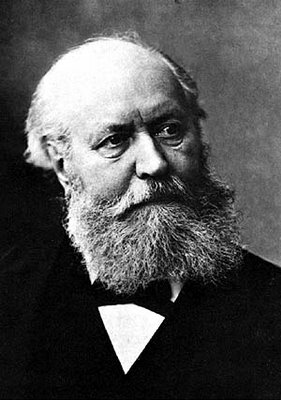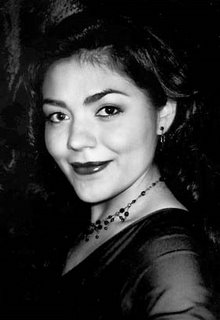 When we think of Gounod, three works stand out: Faust (1859); Roméo et Juliette (1870); and Ave Maria (1853), adapted from the 1st prelude of Bach’s Well-tempered Clavier (its original version was Méditation sur le premier Prélude de Piano de J. S. Bach for violin and piano; the words were added later in 1859). Perhaps one might recall his Marche funèbre d’une marionnette that accompanied the credits of Alfred Hitchcock Presents. Despite the endurance and fame of these works, most of Gounod’s music has fallen into obscurity. It is certainly no surprise that Roméo et Juliette has found a permanent place in the standard operatic repertoire.
When we think of Gounod, three works stand out: Faust (1859); Roméo et Juliette (1870); and Ave Maria (1853), adapted from the 1st prelude of Bach’s Well-tempered Clavier (its original version was Méditation sur le premier Prélude de Piano de J. S. Bach for violin and piano; the words were added later in 1859). Perhaps one might recall his Marche funèbre d’une marionnette that accompanied the credits of Alfred Hitchcock Presents. Despite the endurance and fame of these works, most of Gounod’s music has fallen into obscurity. It is certainly no surprise that Roméo et Juliette has found a permanent place in the standard operatic repertoire.Last Saturday, July 22nd, conductor Stephen Lord led the National Symphony Orchestra in a semi-staged concert version of Roméo et Juliette at the Filene Center of the Wolf Trap National Park for the Performing Arts. The performance featured the Wolf Trap Opera Company artists, members of the Washington Men’s Camerata, and members of the Washington Women’s Chorus. Lord’s leadership could be very communicative and expressive at places, although for most of the performance his eyes seemed attached to his score, and as a result his posture suffered; from behind it seemed as if he were bereft of a head! Perhaps members of the NSO and chorus might argue that his guidance was ambiguous, since entire sections – in both chorus and orchestra – were missing entrances while Lord did little to intercede. Lord was at his best when he sculpted the most intimate passages with his hands alone; perhaps he didn’t need the baton at all. The chorus was what one would expect of an amateur group: lacking nuance, poor intonation and diction, deficient unification, obtrusive, etc. The choir’s performance was decrepitly out of place, especially when compared to many of the superb musicians with whom they shared a stage. The orchestra’s performance, on the other hand, regardless of some apathetic playing throughout, was convincing both as an accompanying and solo force.
 Soloists worth mentioning are Chad Freeburg, tenor (Roméo); Weston Hurt, baritone (Paris/Gregorio); Museop Kim, baritone (Capulet); Fiona Murphy, mezzo-soprano (Stéphano); and Ailyn Pérez, soprano (Juliette). Freeburg and Pérez were a flattering combination of star-crossed lovers. Freeburg’s middle and lower tessituras were resonant and engaging; it was unfortunate that he didn’t have the same command over his stratospheric register, as did Pérez, who heated up the room with her dynamic rendering of Juliette. Freeburg did, however, end his first attention-grabbing aria with a luscious decrescendo that was worthy of the many-shouted “bravi” it received. I’ve learned from hearing Kim as Raimbaud in Rossini’s Le Comte Ory – which I had seen the night before at The Barns – that his singing is consistently beautiful, despite some heavy vibrato here and there. Murphy’s depiction as Stéphano, although a brief role, was one of the most vibrant and memorable of the evening.
Soloists worth mentioning are Chad Freeburg, tenor (Roméo); Weston Hurt, baritone (Paris/Gregorio); Museop Kim, baritone (Capulet); Fiona Murphy, mezzo-soprano (Stéphano); and Ailyn Pérez, soprano (Juliette). Freeburg and Pérez were a flattering combination of star-crossed lovers. Freeburg’s middle and lower tessituras were resonant and engaging; it was unfortunate that he didn’t have the same command over his stratospheric register, as did Pérez, who heated up the room with her dynamic rendering of Juliette. Freeburg did, however, end his first attention-grabbing aria with a luscious decrescendo that was worthy of the many-shouted “bravi” it received. I’ve learned from hearing Kim as Raimbaud in Rossini’s Le Comte Ory – which I had seen the night before at The Barns – that his singing is consistently beautiful, despite some heavy vibrato here and there. Murphy’s depiction as Stéphano, although a brief role, was one of the most vibrant and memorable of the evening.In particular, I appreciated the supertitle translations, which were written specifically for this semi-staged concert. Wolf Trap Opera director Kim Pensinger Witman commented in her program notes:
[The] primary purpose [of the supertitles] is to transport the listener more fully into the story. The opera’s librettists borrowed freely and frequently from the original play, translating Shakespeare’s lines directly into French. We have chosen to return those particular lines to their original form rather than translating them into modern English.The evening was host to many sublime moments. The overture was captivating, complete with several cymbal crashes and dramatic flares, an energetic fughetta, and plenty of fire to propel the rest of the evening. The excellent lyrical moments that stand out were the duet between Roméo and Juliette in Act One when he visits her in her room, as well as the fughetta played by the strings that accompanied the wedding ceremony. The beauty of the latter brought a tear to my eye. The magnificent climax of the opera in the very last scene, that riveting and heart-wrenching duet, is beyond my ability to articulate. I can, however, articulate how effective the sound amplification was. It did not distort the voices at all; in fact, it was not noticeable as amplification but rather as sound reinforcement.
Daniel Ginsberg, 'Romeo et Juliette' (Washington Post, July 24) |
Despite the storm we endured that night, there was quite an attendance. Most people were fortunate to sit in the shelter of the theater while others weathered the storm on the lawn outside with blankets and umbrellas. For those of you who visit the Filene Center in the future, I would recommend arriving early enough to find parking as close as possible; otherwise you might be subjected, like I was, to the mini-trolley that transports people from all the ends of the parking lot right up to the gates of the theater. The transportation is brisk and unsafe – I made note to check the inventory of white knuckles surrounding me – and guaranteed to give you many lungs-full of exhaust! Why pound a nail in the coffin when you can ride the mini-trolley?
No comments:
Post a Comment